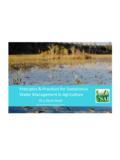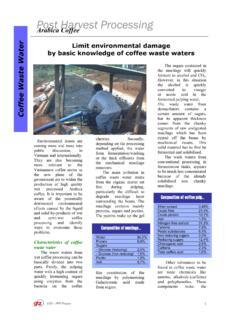Transcription of Feasibility Study: Integration of social aspects into LCA
1 1. Rainer Grie hammer1, Catherine Beno t, Louise Camilla Dreyer, Anna Flysj , Andreas Manhart, Bernard Mazijn, Andr e-Lise M thot and Bo Weidema (Freiburg, may 2006). Feasibility study : Integration of social aspects into LCA. Abstract The Feasibility study was prepared in a multi-stage discussion process within the context of the Task Force " Integration of social aspects into LCA" of the UNEP-SETAC Life Cycle Initiative. The methodology of environmental or biophysical LCA was taken and checked, whether and how social aspects can be integrated or supplemented to conduct a social LCA. (SCLA). Furthermore core elements and requirements upon the Integration of social aspects are formulated. In terms of methodology, there are evidently no fundamental problems calling the Feasibility of SLCA into question.
2 There are however certainly considerable hurdles to be overcome in practice, especially in characterisation modelling, because social impacts will require an entirely different type of modelling. Hurdles arise in the goal and scope definition (for example system boundaries and allocation/cut off criteria), in the categorization of indicator groups, in the classification of the associated individual indicators and in their characterization. It is quite probable that the very different appraisals of social aspects by different actors and in different countries, in combination with the process of interdisciplinary scientific discourse, will delay agreement for a longer time. To promote the development and practical use of social LCA the next important steps are to conduct more case studies, to establish a generally accepted list of well defined social indicators, to establish databases and to collect modules for the upstream chains and to compose an (extended) "code of practice" for social LCA.
3 1 Status The Feasibility study was prepared in a multi-stage discussion process within the context of the Task Force " Integration of social aspects into LCA" of the UNEP-SETAC Life Cycle Initiative. The content and drafts of the study were discussed at the Task Force meetings in Bologna (January 2005), Lille (May 2005) and Brussels (November 2005). Main topics were 1. Contact: Dr. Rainer Griesshammer Eco-Institute, PO-Box 50 02 40, D-79028 Freiburg, Germany;. Email: phone 0049-761-45295-50. 2. discussed in a formal procedure with a questionnaire and contributions of the members of the taskforce2. 2 Goal of the Feasibility study The aim of the Feasibility study is to identify whether and in what manner social aspects can be integrated into environmental biophysical LCA3 methodologies, and how the process towards agreement in the expert community (Code of Practice) and towards standardization over the long term could best be shaped.
4 Furthermore, core elements of and core requirements upon the Integration of social aspects shall be formulated. In the sustainability debate in some countries, the terms social and societal are defined differently and indeterminately, without sharp boundaries. The following presentation uses social as a generic term4. The precise meaning needs to be clarified when selecting and defining social indicators. 3 Background The Feasibility study was prepared within the context of the Life Cycle Initiative (UNEP/SETAC), and thus relates essentially to Life Cycle Assessment within the environmental dimension and to the Integration of full product systems. Both within the Life Cycle Initiative and beyond, there are moves towards the parallel or integrated analysis of both social and economic aspects (Life Cycle Costing) and towards sustainability analysis across entire product cycles ( PROSA - Product Sustainability Analysis/Eco-Institute, SEE Socio-Eco-Efficiency-Analysis/BASF, PSAT Product Sustainability 2.)
5 Benoit, C. ; M thot, ; Rev ret, ; H bert, Julie : General comments on social indicators. Document 2005; Benoit, C. ; H bert, J. ; M thot, ; Rev ret, ; C t , V.: Revised List of social indicators. Excel document 2005; Dreyer, L. C.: Comments on Bo Weidema's presentation. Document 2005; Flysj , A: Comments on Bo Weidema's indicator classification. Email & spreadsheet; 2005 Grie hammer, R.: Questionnaire on social indicators / damage categories. Document 2005; Grie hammer, R.: List of social indicators. Spreadsheet 2005; Marshall, K.: Fundamental comments on Bo Weidemas proposal. Document 2005; Mazeau, P.: Comments on Bo Weidema's indicator classification. Email 2005; Mazijn B., Doom R., Peeters H., Spillemaeckers S., Vanhoutte G., Taverniers L., Lavrysen L., Van Braeckel D.
6 , Duque Rivera J. (2004), "Ecological, social and economical aspects of integrated product policy - Integrated Product Assessment and the development of the label 'sustainable development'. Final Report, UGhent-CDO/Ethibel, Belgian Sicence Policy, Project CP/20, 124 pp. plus annexes; M thot, ; Rev ret, ; Benoit, C; H bert, J.; Plouffe, S.: Comments about the proposal for a consistent structure for modelling the social impact chains inventory results to damage categories. Document 2005; M thot, ; H bert, J.; ACVS-FIDD First Results. PPT Document 2005; M thot, Todd, Susan ; H bert, J. ; ACVS-FIDD Results, Comparisons GRI and ACVS-FIDD. PPT Document 2005; M thot, , Rev ret, ; H bert, J., Benoit, C.: Comparisons of the ACVS-FIDD and the Integrated Product Assessment Tool by Integrating social aspects in a LCA Setting.
7 PPT Document 2005; Pelupessy, W.: Socioeconomic criteria in LCA. Email 2005; Ugaya C.: Comments on the list of social indicators. Email & Spreadsheet 2005; Weidema, B.: A consistent structure for modelling the social impact chains from inventory results to damage categories. Presentation & Document 2005. 3. In the following we take the names environmental LCA (or just LCA) and social LCA (or SLCA). 4. It is worth noting that generic terms are also used in the other dimensions. For instance, the economic dimension covers both micro-economic and macro-economic aspects . 3. Assessment/Procter&Gamble, Sustainability Compass/German Telecom ). A synopsis of proposed approaches and case studies on sustainability assessment of products showed a broad range of names, definitions and methodologies6.
8 Furthermore, there is an intense debate on the Integration of social aspects in reporting and in the rating of companies (sustainability rating, GRI Global Reporting Initiative, Global Compact, planned ISO. standard on CSR etc). While the performance of an environmental LCA has been set out in detail by ISO standard 14040 ff., for social Assessment and other similar approaches there is no comparable standard or internationally recognized code of practice. It is a open question whether the environmental LCA and ISO 14044 apply to social LCA (as Bo Weidema states7,8 or not. There are also many contributions from "outside of the LCA-world". Compared to environmental and economic aspects , social aspects present special problems9, because they can be highly diverse and are weighted very differently by different interest groups and in different countries and regions.)
9 A further point is that evaluations of these aspects are subject to swifter change over time than those of environmental aspects . The experience gained in the development of LCA methodology indicates that a coordinated development of a social Life Cycle Assessment (SLCA) methodology suitable for treating social aspects will need about five to ten years. Past experience in product sustainability assessment shows that major product-related social aspects are largely of three types: Particularly severe positive or negative effects (hotspots) at the level of resource extraction, upstream chains, production or trade that can be attributed directly to the product: Examples are destruction of systems that support human livelihoods, child labour, wages below subsistence level, etc.
10 Utility aspects and impacts upon consumers. Indirect effects of product use upon society, such as changes in society caused by cars or mobile phones (comparable to the discussion on rebound effects in environmental LCA). 5. Rainer Grie hammer, Matthias Buchert, Carl-Otto Gensch, Christian Hochfeld und Ina R denauer., "PROSA. Klartext zur sozialen und gesellschaftlichen Dimension von Produkten", UmweltWirtschaftsForum, , H. 1, M rz 2004; ; Marina Franke, Procter&Gamble, " PSAT - Prodcut Sustainability Assessment Tool: A Method under Development; Congress "PROSA - Product Sustainability Assessment, Challenges, case studies, methodologies", Lausanne July 2005; Andreas Kicherer, BASF, "SEEbalance - The Socio- Eco-Efficiency Analysis", Congress "PROSA - Product Sustainability Assessment, Challenges, case studies, methodologies", Lausanne July 2005 ; Tim Otto, Deutsche Telekom, "Sustainability Compass (SC).










